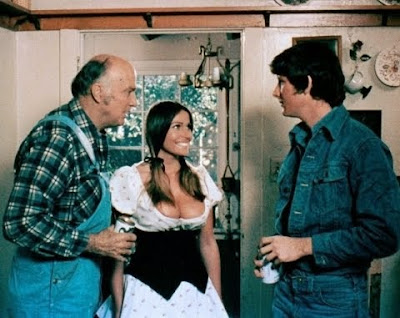District 9
It has been said more than once that science fiction is a rather maleable genre. That is, you can use the fantastical elements of the future to make salient statements about the now. Philip K. Dick did it with his great novels of the 60s. Alfred Bester and William Gibson did and do much the same. Even 1950s films like THE DAY THE EARTH STOOD STILL and B-classics like THE BLOB probed the current political landscape, conveyed insight into contemporary mores. Sometimes, an artist need only to create an alternate reality/timeline, one in which the chronology of years mirrors reality, but the landscape and events may be born only out of fantasy, in order to punch across the main ideas.
DISTRICT 9 indeed punches everything across. "Bludgeons" would be apt.
This is a whiz-bang 21st century entertainment, complete with many of the hallmarks of contemporary filmmaking. The pace, the editing, the effects-all intense. Necessarily so. Writer/director Neill Blomkamp was commissioned by Peter (LORD OF THE RINGS) Jackson for the comparatively low sum of 30 mil to realize his stark visions of alienation. OK, bad pun, and clumsy ref to an earlier film. But that's accurate; that's the essential theme. Isolation. On the outside looking in.
The story: 20 years ago a massively large alien spacecraft appeared over downtown Johannesburg, South Africa. After a while, govt. agents braved an invasion of the ship, finding a race of sickly extraterrestrials inside. They are rounded up and brought down to earth. At first, humanitarian efforts win out. Soon, earthlings rebel-why should all these funds be allocated to helping aliens? We have very real problems among our own kind!
The mob mentality grows, protestors hoist signs crying "down with disease carrying outsiders" and such. District 9, a collection of unstable shacks amid a desert wasteland outside the city, becomes the aliens' forced abode. It is a militarized zone, to boot. A group of Nigerian gangsters also settles there, exploiting the inhabitants in numerous ways. Namely, extorting their unique weaponry (which cannot be fired humans) in exchange for food (cat food, actually, one of the film's sly bits of humor).
Many of the aliens are quite clever, somehow over the years learning to understand and read (if not speak) English. One of them, dubbed "Christopher Johnson" by the military, is secretly planning to get back to the mother ship and homeward bound. Assisting is his young son, "Little C.J.", as adorable as a CGI alien could possibly be. Mostly though, the alien culture is characterized by the basest behaviors, perhaps understandable in this ghetto into which they've been forced.
The circumstances eventually become uncontrollable, and soon a new living area is erected, District 10, complete with supposedly better living conditions, designed for the dispossessed ETs. In charge of the non-violent eviction of the aliens from District 9 is one Wikus van de Merwe (Sharlto Copley, a first-timer). He's an Everyman, a pencil pushing pacifist who finds himself in a most disturbing situation after accidentally exposing himself to a mysterious black liquid during one of the eviction sweeps. He gets sick, coughs up black stuff. Then, his left hand suddenly transforms into something that looks alarmingly similar to an alien appendage. Needless to say, his life turns inside out and he finds himself a fugitive. An alliance with Christopher provides much of the drama. That black fluid is quite integral in the proceedings.
Blomkamp does not eat up valuable time with exposition. Rather, he gives us all the information we need via a documentary-style conceit, where sociologists, scientists, and govt. types all recall the sad story. As we listen, it is immediately clear that Wikus will not (necessarily) escape his predicament unscathed.
The writer/director plunges us into his dark tale also with breathless editing among b & w surveillance video, infrared, you name it. Everything used services the story; nothing is utilized for its own sake. As the story gels, a more conventional narrative emerges, but the pace never slacks, and the jabs never soften. Blomkamp grew up in South Africa, and it is not possible to separate the horrible memories of apartheid from this scenario. Trenchant points about immigration are also made, and I also thought back to a mere few years ago to the fallout of Hurricane Katrina, where suddenly thousands of homeless American citizens were now "refugees", reduced to living in govt. shacks.
DISTRICT 9 reminded me of many earlier films. As Wikus' anatomy changes, I thought on THE FLY (80s version), especially as the poor soul laments the effects of this on his marriage. Late in the film, a rather efficient piece of hardware seemed directly inspired by ROBOCOP (also quite the social commentary). But Blomkamp has otherwise fashioned an original entertainment that is an absolute must for genre fans. I would say it's also pretty necessary for lovers of film, in general. That is, if you're not bothered by a lot of icky effects and liberal use of profanity. Under the circumstances in this film, neither seems gratuitous.



Comments